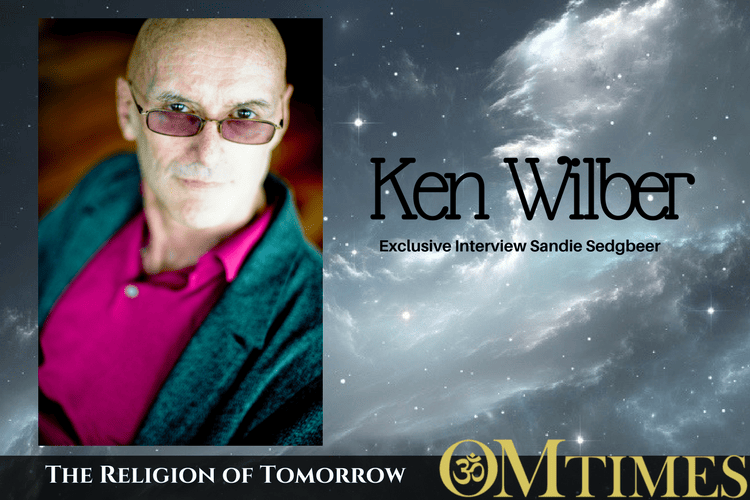Ken Wilber: The Religion of Tomorrow


And what growing up means is that if you look at all of this intelligence, we’re not born with any of them in a fully developed or mature or in some cases even functioning way. All of that intelligence grows and develop.
Now, it turns out that you can have a waking up experience, you can have an experience of being one with the entire universe, one with spirit, one with the ground of all being, one with everything, one with the moment, but you interpret that experience based on the stage of growing up that you’re at. So, if you’re at an egocentric stage of development, and you’re a Christian, and you have an experience of being one with Christ, you have an experience of your own Christ consciousness, you have an experience of being one with divine spirit, if you’re truly egocentric, then you might think that that experience applies only to you, that you are Jesus Christ.
And it’s funny because Ram Dass tells a story where his brother was institutionalized because he was schizophrenic. He thought he was Jesus Christ. But, Ram Dass said, as soon as you met him, you could tell that he had had a profound waking up experience. He knew that he was one with Jesus. He said you could see his authenticity. It was unmistakable.
But, his mother didn’t think that anybody else could have that experience including Ram Dass. So, here’s somebody who has an authentic waking up experience, but he’s at an egocentric stage of development, so he thinks that he and he alone can have that kind of experience.
He could continue growing, and if he moved from egocentric up to ethnocentric. If he moved from selfish up to care, then he might be a fundamentalist Christian, for example, and then he has an experience of being one with Christ, realizes his own true self, his Christ consciousness, being a fundamentalist Christian, he’ll think that only those people who believe in Jesus Christ and accept him as their personal savior, only those people can have that kind of true spiritual oneness experience.
Other people might think they have a spiritual oneness, but if they don’t accept Jesus, they’re not really having that kind of profound spiritual oneness. And so, that person truly believes that.
Sandie Sedgbeer: Ken Wilber, I have a question to ask you. Why do we need religion at all?
Ken Wilber: Well, in terms of what these two dimensions mean, let me just finish briefly by explaining the growing upside of this question, because we just talked about somebody egocentric and ethnocentric and how they can both have authentic waking up experiences, but they’ll interpret it in terms of their stage of growing up. This especially is important because, if you move from ethnocentric to world-centric or to universal care, then you’ll have an understanding that not only you and not only a Christian, but all human beings have access to and a capacity to experience this great waking up experience, to become one with the ground of all being. You could not be at a world-centric stage of growing up and engage in the crusades. It wouldn’t happen. You wouldn’t have that motivation.
So, even though they’ve had profound waking up experiences, if they’re at the lower stages of growing up, they’re not going to generate impartial, universal love for all beings. They’re gonna have a great deal of suspicion and even hatred of those who are not part of their own group, their own tribe, so to speak.
None of them understand growing up. And that’s the disaster. So, that’s why we have a religion that can both be the source of an enormous amount of love and universal and compassion and care and a source of crusades and ethnocentric Jihad and holy war and overall just disastrous types of consequences. So, it’s important that we understand both dimensions of spirituality.
Sandie Sedgbeer: So, what about if we go back to say the Druids or certain indigenous tribes who like the Lakota Sioux, for instance, who’ve never had a word for God. As far as they were concerned, nature, you know, was everything. They were at one with nature. They were at one with their surroundings. The Druids, had a great love for humanity, for nature, etc. Would you say that they were awake but not grown up?
Ken Wilber: Well, if they were awakened to the ultimate ground of being, and if they really were at a world-centric stage of development, then that would be fine. And if that were the case, then they would not engage in things like, oh, child human sacrifice, they would not engage in things like warfare or judging other tribes to be inferior. And if they did all of that, then fine. And they’re not a problem. If they did all of that, then they would be part of humanity that was truly exhibiting a genuine universal love, and that would be the good thing about spirituality. Very, very few earlier cultures did that, by the way, very few.
What happens is, in the growing up dimension, human beings continue to evolve. And when it comes to the waking up dimension, there was a time, perhaps a million years ago, when human beings did not have access to waking up. And the first human cultures that seemed to be engaged with some of the Shamanic cultures. So, they had nature mysticism.
Not too many of them were at world-centric stages of growing up, simply because for most cultures, have to grow, have to go from infancy to childhood to adolescence to adulthood.
And regarding continuing to grow and develop, that’s simply what happens with evolution in general. I mean, if you look at almost any discipline that we are involved in, say physics or chemistry or science, human beings continue to learn more and more and more about those areas the longer we exist and the longer we investigate what’s going on.
So, we’re continuing to learn. There’s still more and more and more information that exists in the relative world, and therefore, if we’re gonna become one with everything, one with the ground of everything, that everything is becoming fuller and fuller and fuller as human beings continue to grow and evolve. People 500 years from now, 1,000 years from now will be more developed than we are unless everything goes to hell or the robots take over or whatever dystopia might happen. But we think things are gonna continue to get better.
Sandie Sedgbeer: You have talked about spiritual intelligence and waking up and growing up, two stages of development. There are two more, cleaning up and showing up. And you also talk about the dysfunctions in the different states and structures of consciousness. Tell us about the other two, cleaning up, which is shadow work, and showing up.
Ken Wilber: What we have been doing here as we look at waking up and growing up is actually looking at the various areas that spirituality itself applies to when it comes to human beings, because what we’re finding is that most people just don’t know the full riches of what a genuine spirituality can encompass and the many extraordinarily positive potentials and capacities that a full-bodied spirituality can bring.
And one of them is that, as you’re saying, a genuinely full spirituality would help you not only wake up, it would help you grow up. But, then we also find that there are a couple other areas that it can help with, as well. And it’s also important that these areas be considered because they’re going to show up anyway, and if we’re not consciously dealing with them, then they’ll simply sort of unconsciously hit us over the head.
And one of them we call cleaning up. And most people know what cleaning up is, and it has to do with the human capacity to have unconscious impulses and values and complexes, commonly associated with the name of Freud. But, there are many different approaches to it. And its sort of generally referred to as doing shadow work, the shadow being unconscious material, stuff that we have that belongs to us but that we’re unaware of or that we repress or push out of awareness, or we don’t want to deal with, or we’re afraid to deal with. And so, whenever we have some impulse like that or some idea or some quality or some value, and for whatever reason, we dislike it, we think it’s bad, we don’t like experiencing it, we tend to push it out of awareness. We repress it. We hide it.
A veteran broadcaster, author, and media consultant, Sandie Sedgbeer brings her incisive interviewing style to a brand new series of radio programs, What Is Going OM on OMTimes Radio, showcasing the world’s leading thinkers, scientists, authors, educators and parenting experts whose ideas are at the cutting edge. A professional journalist who cut her teeth in the ultra-competitive world of British newspapers and magazines, Sandie has interviewed a wide range of personalities from authors, scientists, celebrities, spiritual teachers, and politicians.




